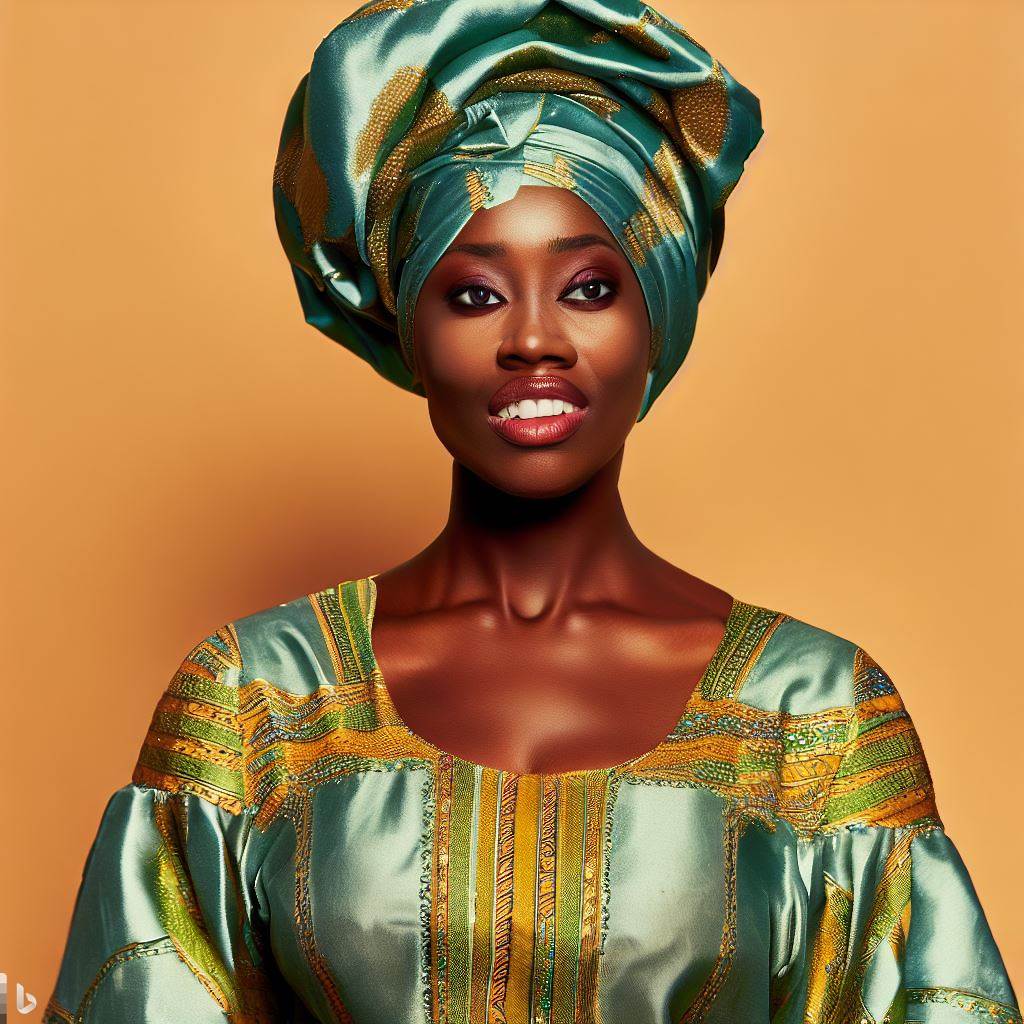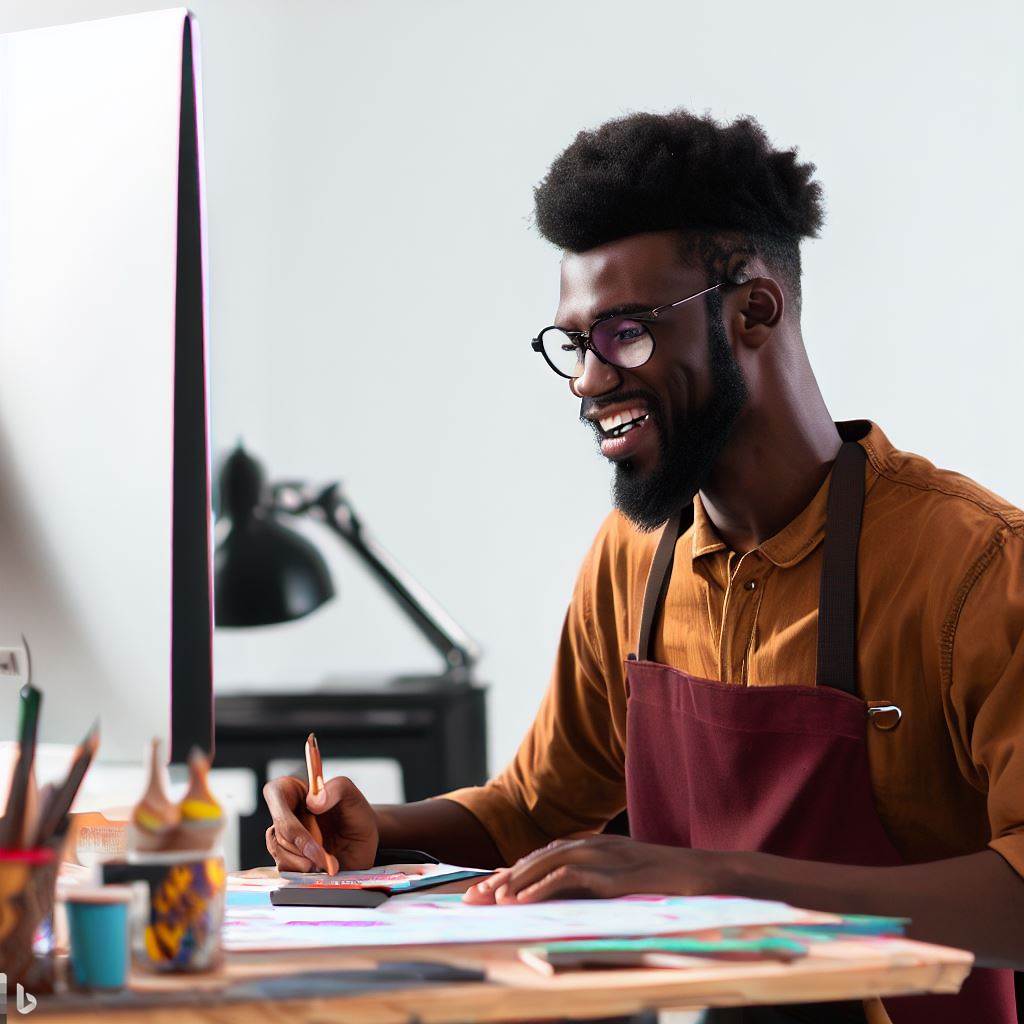Introduction
Understanding the salary expectations in the field of costume design in Nigeria is crucial for aspiring professionals.
By delving into this topic, individuals can effectively plan their careers, make informed decisions, and negotiate fair compensation packages.
Investing time in researching salary expectations is essential for career growth and financial stability.
Overview of the Costume Designer Profession in Nigeria
A costume designer plays a crucial role in any production, ensuring that the characters are dressed appropriately to portray the intended message.
They are responsible for creating and selecting costumes, fabrics, and accessories that accurately depict the characters and their personalities.
In the Nigerian entertainment industry, costume design is of utmost importance.
It not only enhances the visual appeal of a film, theater production, or fashion show but also helps to bring the story to life by providing a deeper understanding of the characters and their backgrounds.
Costume designers in Nigeria have a wide range of sectors where they can work, including:
A. Film Industry
In the Nigerian film industry, also known as Nollywood, costume designers are in high demand.
They collaborate with directors, production designers, and makeup artists to create costumes that accurately reflect the setting, time period, and characters envisioned in the script.
Whether it’s a contemporary film or a historical epic, costume designers meticulously research and select costumes that fit the narrative while also considering the actors’ comfort and the production’s budget.
B. Theater Productions
Theater productions in Nigeria rely heavily on the creative vision of costume designers.
From designing costumes for plays, musicals, and dance performances to coordinating fittings and alterations, costume designers are essential in bringing the characters to life on stage.
They work closely with directors, set designers, and choreographers to understand the production’s concept and storyline, ensuring that the costumes complement the overall aesthetics and contribute to the audiences’ engagement.
C. Fashion Shows
The Nigerian fashion industry is renowned for its vibrant and diverse designs. Costume designers often collaborate with fashion designers and stylists to create captivating costumes for fashion shows and events.
They carefully select garments, accessories, and hairstyles that showcase the latest fashion trends while aligning with the designer’s vision and the event’s theme.
Costume designers in this sector have the opportunity to unleash their creativity and make a lasting impression on audiences.
D. Advertisements and Commercials
Costume design extends beyond the entertainment sector in Nigeria. Advertising agencies and production companies often seek costume designers for commercials, photo shoots, and brand campaigns.
Costume designers in this sector must understand the target audience, brand values, and message to create costumes that effectively communicate the desired image or story.
They work closely with directors, photographers, and art directors to achieve the desired visual impact.
In Nigeria, the demand for skilled and talented costume designers is on the rise across the entertainment and fashion industry.
Whether it’s bringing characters to life on the big screen, adding flair to theater productions, showcasing the latest fashion trends, or enhancing brand campaigns, costume designers play a vital role in creating memorable and impactful experiences.
As the Nigerian entertainment industry continues to grow, so does the recognition and appreciation for the art of costume design.
With its rich cultural heritage and diverse storytelling, Nigeria offers a unique and exciting platform for costume designers to showcase their talent and make a distinct mark in the industry.
Read: Women in Graphic Design: A Look at the Scene in Nigeria
Factors Affecting Costume Designer Salary Expectations
When it comes to determining salary expectations for costume designers in Nigeria, several factors come into play.
Here are the key factors that can influence the earning potential of a costume designer:
A. Education and Qualifications
- Obtaining a formal education in costume design, such as a degree or diploma, can positively impact salary expectations.
- Having relevant certifications or specialized training in specific costume design techniques can also be advantageous.
B. Experience and Portfolio
- Costume designers with a solid track record of experience and an impressive portfolio tend to command higher salaries.
- Working on high-profile projects or collaborating with well-known personalities can significantly boost earning potential.
C. Type of Employer
- The type of employer a costume designer works for can greatly affect salary expectations.
- Costume designers employed by production companies, theaters, fashion houses, or film studios may have different salary ranges.
D. Location within Nigeria
- The geographical location within Nigeria can impact the earning potential of a costume designer.
- Cities with a thriving entertainment industry, such as Lagos or Abuja, may offer higher salaries compared to smaller towns or rural areas.
E. Market Demand and Competition
- The level of demand for costume designers and the competition within the industry can affect salary expectations.
- In a highly competitive market with a limited number of job opportunities, salaries may be lower.
Considering these factors, costume designers need to evaluate their qualifications, experience, and the industry landscape to set realistic salary expectations.
By constantly improving their skills, expanding their network, and staying updated on industry trends, costume designers can enhance their earning potential over time.
Read: The Rise of Fashion Design in Nigeria’s Creative Industry
Average Salary Range for Costume Designers in Nigeria
When it comes to the world of costume design in Nigeria, many aspiring professionals want to know what they can expect in terms of salary.
In this blog, we will explore the average salary range for costume designers in Nigeria, discuss the discrepancy between entry-level and experienced professionals, and highlight the potential for growth and higher earning potential in this field.
A. Statistical data on salary ranges in the costume design field
According to recent data, the average salary range for costume designers in Nigeria varies depending on factors such as experience, skill level, and the type of projects they are involved in.
On average, costume designers can expect to earn between ₦800,000 to ₦4,000,000 per year.
However, it is important to note that these figures can significantly differ based on individual circumstances.
B. The discrepancy between entry-level and experienced professionals
For entry-level costume designers in Nigeria, the salary range may be lower compared to their more experienced counterparts.
On average, entry-level costume designers can expect to earn between ₦500,000 to ₦1,500,000 per year.
As they gain more experience and build a reputation in the industry, their earning potential increases.
Experienced costume designers, on the other hand, can earn significantly higher salaries.
Those with a proven track record and a strong portfolio can command salaries ranging from ₦2,500,000 to ₦15,000,000 per year or even more, depending on the scale and prestige of their projects.
C. The potential for growth and higher earning potential
While the entry-level salary for costume designers may seem modest, the potential for growth and higher earning potential in this field is promising.
As costume designers gain more experience and expertise, they become more sought after in the industry, opening doors to higher-paying opportunities.
For instance, costume designers who successfully work on high-profile movies, television shows, or theater productions can attract bigger budgets, leading to higher salaries.
Additionally, costume designers who establish their own businesses or offer specialized services such as bespoke costume design can also earn significantly higher incomes.
It is important to note that continuous professional development, networking, and expanding one’s skillset can contribute to career advancement and higher earning potential in the field of costume design.
In essence, the average salary range for costume designers in Nigeria varies greatly depending on experience, skill level, and project type.
Entry-level professionals can expect to earn between ₦500,000 to ₦1,500,000 per year, while experienced costume designers can earn between ₦2,500,000 to ₦15,000,000 per year or more.
The potential for growth and higher earning potential in this field is promising, with opportunities for increased salaries based on reputation, project scale, and specialization.
Aspiring costume designers should focus on building their skills, gaining experience, and establishing a strong portfolio to maximize their earning potential in this dynamic industry.
Read: Nollywood’s Demand for Costume Designers: A Deep Dive

Discover More: Exploring the Impact of Digital Design in Nigeria’s Tech Boom
Case Studies: Successful Costume Designers in Nigeria
In this section, we will explore the profiles, success stories, career trajectories, salary expectations, achievements, and industry influence of notable Nigerian costume designers.
1. Deola Sagoe
- Profile: Deola Sagoe is a renowned Nigerian fashion and costume designer known for her unique African-inspired designs.
- Success Story: She gained international recognition after showcasing her collection at the New York Fashion Week.
- Career Trajectory: Deola Sagoe started her fashion career in the early 1990s and has since become a household name in Nigeria.
- Salary Expectations: As an established designer, Sagoe’s salary expectations are high and can range from ₦1 million to ₦5 million per annum.
- Achievements: She has received numerous awards for her outstanding designs, including the Designer of the Year at the African Fashion Awards.
- Influence on the Industry: Deola Sagoe’s designs have influenced the Nigerian fashion industry, promoting African heritage and incorporating traditional prints.
2. Mai Atafo
- Profile: Mai Atafo is a Nigerian fashion designer and costume stylist popularly known for his bespoke menswear.
- Success Story: He successfully transitioned from a career in engineering to becoming a respected and sought-after fashion designer.
- Career Trajectory: Mai Atafo launched his eponymous fashion brand in 2011 and has since dressed numerous celebrities and high-profile individuals.
- Salary Expectations: With his reputation and client base, Atafo’s salary expectations range from ₦2 million to ₦8 million annually.
- Achievements: He has won several awards, including the Fashion Brand of the Year at the Nigerian Entertainment Awards.
- Influence on the Industry: Mai Atafo’s designs have influenced the Nigerian fashion industry, particularly in the menswear segment, with his signature style.
3. Yemi Osunkoya
- Profile: Yemi Osunkoya is a Nigerian-born British fashion designer and founder of the Kosibah brand.
- Success Story: He gained recognition for designing wedding dresses, particularly for his impeccable fit and attention to detail.
- Career Trajectory: Osunkoya established his brand in London in 1991 and continues to create stunning couture pieces.
- Salary Expectations: Being an internationally acclaimed designer, Yemi Osunkoya’s salary expectations are around ₦3 million to ₦10 million annually.
- Achievements: He has dressed notable celebrities, including Oprah Winfrey and British royalty.
- Influence on the Industry: Yemi Osunkoya’s craftsmanship and elegant designs have made a significant impact on the wedding and couture industry in Nigeria and beyond.
4. Zizi Cardow
- Profile: Zizi Cardow is a Nigerian fashion designer known for her vibrant and eclectic designs.
- Success Story: She gained attention for winning the MNET/Vlisco Fashion competition in 2002, which launched her career.
- Career Trajectory: Zizi Cardow established her fashion label in 2000 and has been a key player in the Nigerian fashion scene ever since.
- Salary Expectations: With her established brand, Cardow’s salary expectations can range from ₦1.5 million to ₦6 million annually.
- Achievements: She has received several awards, including the Africa Fashion Week Nigeria Best Female Designer Award.
- Influence on the Industry: Zizi Cardow’s unconventional designs have inspired many other designers. This has contributed to the diversity of the Nigerian fashion industry.
These case studies exemplify the success and impact of Nigerian costume designers in the fashion industry.
They have not only achieved international recognition but also influenced the industry within Nigeria.
Read: Employment Opportunities for Costume Designers in Nigeria
Tips for Negotiating Costume Design Salaries
When it comes to negotiating salary expectations as a costume designer in Nigeria, it’s important to have a clear strategy in mind.
Here are some tips to help you effectively negotiate your costume design salary:
- Showcase your skills and accomplishments: Demonstrate your expertise and highlight any past successes or projects that showcase your abilities.
- Prepare a compelling portfolio: Compile a portfolio that showcases your best work and use it to demonstrate your creativity.
- Research industry standards: Conduct market research to determine the average salary range for costume designers in Nigeria. This will provide you with a baseline for your negotiation.
- Emphasize your unique value: Highlight what sets you apart from other costume designers.
- Practice effective communication: Clearly articulate your salary expectations and be prepared to support them with tangible reasons.
- Focus on long-term growth: Discuss your potential contributions to the company’s growth.
- Consider non-salary benefits: If salary is low, consider negotiating for alternative benefits like flexible hours or extra vacation days.
- Stay professional throughout the process: Project professionalism in negotiations for a positive impact on prospective employers.
- Show enthusiasm and passion: Demonstrate your genuine interest in the role and the company. This can work in your favor during salary negotiations.
- Be open to compromise: Advocate for your worth but be open to negotiating a win-win solution.
Gain More Insights: Nigeria’s Production Design: Job Outlook & Trends
Conclusion
Understanding costume designer salary expectations in Nigeria is crucial for aspiring professionals in this field. It helps them set realistic goals and make informed career decisions.
Aspiring costume designers should strive for growth and continuous improvement in their skills and knowledge.
They should aim to enhance their creativity, stay updated with trends, and develop a strong network within the industry.
The impact of costume design on the Nigerian entertainment industry cannot be ignored.
It plays a significant role in bringing characters to life, setting the tone and atmosphere of productions.
As the Nigerian entertainment industry continues to grow, costume design will continue to be an essential element in productions.
Aspiring costume designers have the opportunity to make a significant impact on this dynamic industry.




